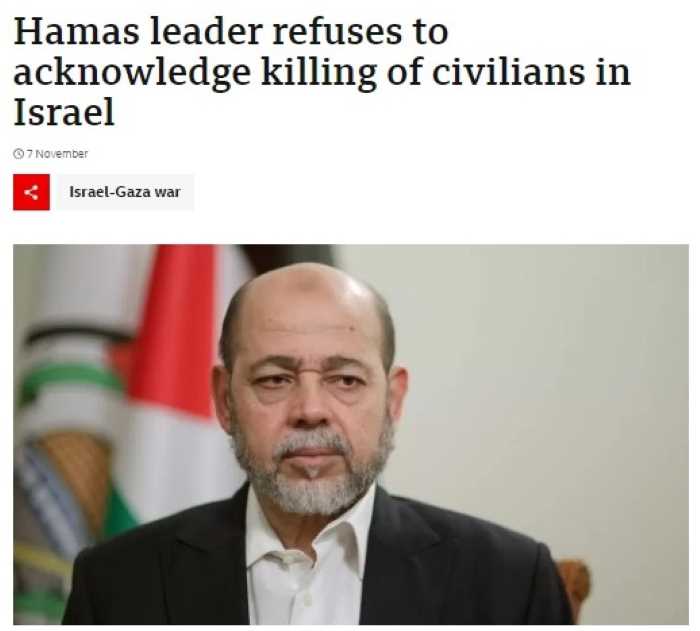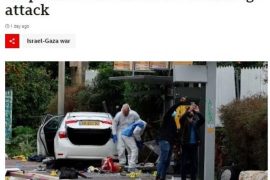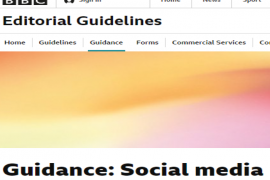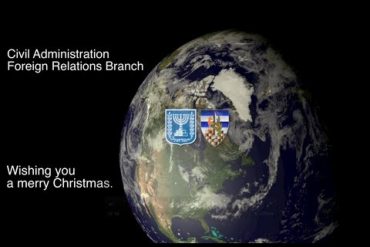A post by CAMERA Arabic.
On November 7th the BBC News website published a report by Feras Kilani of BBC Arabic under the headline ‘Hamas leader refuses to acknowledge killing of civilians in Israel’.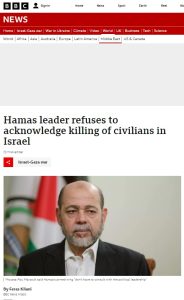
An Arabic language version of that BBC interview conducted “in the Gulf” with Mousa Abu Marzouk (also Moussa or Musa) was published on the same day on the BBC Arabic website under the headline ‘Musa Abu Marzouk to the BBC: Hamas did not kill civilians in Israel’.
As reported by the Telegraph on November 25th, those two headlines were not the only examples of differences between the English language and Arabic language versions.
“But while in the English version of the interview Mr Kilani laid out evidence gathered by the BBC and other media outlets showing that Hamas had killed and kidnapped civilians, this was barely mentioned in the Arabic version.
In one passage, the English version of the online article states that “a senior Hamas leader has refused to acknowledge that his group killed civilians in Israel, claiming only conscripts were targeted”.
It goes on to say that Moussa Abu Marzouk told the BBC that “women, children and civilians were exempt” from Hamas’s attacks, adding: “His claims are in stark contrast to the wealth of evidence of Hamas men shooting unarmed adults and children. The proof includes video from Hamas body cameras and first-hand testimony given to international news networks.”
However, the Arabic version of the same passage states merely that “a senior Hamas leader has insisted that his group did not kill civilians in Israel, stressing only conscripts were targeted”.
While Mr Kilani reports as a claim by Israel that “more than 1,400 people were killed by Hamas in the 7 October attacks, most of them civilians” in the Arabic version, he fails to refer to the “wealth of evidence” gathered independently that Hamas shot civilians, which he mentioned in the English version.”
CAMERA UK can provide a full comparison between the two versions of the report.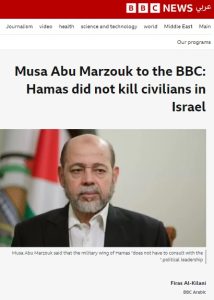
Notably, the Arabic version minimizes the vast body of evidence showing that Israel’s civilian population was targeted on October 7, prefers “operation” over “atrocities” to describe the events and states that Abu Marzouk was simply “asked” or spontaneously “spoke” whereas he was “pressed” or “challenged” in English.
Parts of the report that appear only in English are marked in blue and parts that appear only in Arabic are marked in red. Both versions include the text appearing in black:
HAMAS LEADER REFUSES TO ACKNOWLEDGE KILLING OF CIVILIANS IN ISRAEL
MUSA ABU MARZOUK TO BBC: HAMAS DID NOT KILL CIVILIANS IN ISRAEL
7 November
Photo caption: Moussa Abu Marzouk said Hamas’s armed wing “don’t have to consult with the political leadership”
By Feras Kilani
BBC News Arabic
A senior Hamas leader has refused to acknowledge insisted that his group did not killed civilians in Israel, claiming stressing only conscripts were targeted.
Moussa Abu Marzouk told the BBC that “women, children and civilians were exempt” from Hamas’s attacks.
His claims are in stark contrast to the wealth of evidence of Hamas men shooting unarmed adults and children.
The proof includes video from Hamas body cameras and first-hand testimony given to international news networks.
Israel says more than 1,400 people were killed by Hamas in the 7 October attacks, most of them civilians.
Mr Marzouk, the group’s deputy political leader, who is subject to an asset freeze in the UK under counter-terrorism regulations, was interviewed on Saturday in the Gulf. He is the most senior member to speak to the BBC since the 7 October atrocities operation carried out by the movement.
The BBC pressed asked Mr Marzouk on the war on Gaza, specifically on the scores of hostages being held inside the territory.
He responded that they were not able to be freed while Israel was bombing Gaza continuously. The Hamas-run health ministry says 10,000 people have been killed since Israel started operations its war on Gaza last month.
“We will release them. But we need to stop the fighting,” he said.
Mr Marzouk recently travelled to Moscow to discuss eight Russian-Israeli dual citizens snatched on 7 October by Hamas, a proscribed terror organisation in many countries including the UK and US.
He said Hamas members in Gaza had “looked for and found two female hostages” from Russia but were unable to release them because of the conflict.
They could only realistically release hostages, he said, if “the Israelis stop the fighting so we can hand them over to the Red Cross”.
Challenged by the BBC Speaking about the attack of 7 October, Mr Marzouk claimed that Mohamed el-Deif, the leader of Hamas’s Qassam Brigades military wing, had ordered his men to spare civilians.
“El-Deif clearly told his fighters ‘don’t kill a woman, don’t kill a child and don’t kill an old man’,” he said.
Reservist soldiers were, he said, “targeted”. He maintained that only “conscripts […] or soldiers” were killed.
But women, children and civilians were “exempt”, he said.
Yet a huge body of evidence has been gathered which documents the range of bloody acts committed by Hamas in Israel on 7 October.
BBC journalists went to the scene of the attacks in their immediate aftermath and saw the bodies of civilians who had been killed.
We have also verified CCTV footage which captured shootings by Hamas. Separately, footage from Hamas body cameras has been shown to the BBC and other journalists by the Israeli government.
Other international news organisations have also pieced together, and verified, evidence of what happened on the day.
The BBC challenged asked Mr Marzouk on this the video segments recorded by the body cameras of Hamas warriors, which show firing at unarmed civilians in their cars and homes, but the leader, whose polished, measured manner during the interview sometimes slipped into irritation, did not answer the question directly.
When asked if Hamas’s political wing had known of preparations for the attack, the deputy leader said that the armed wing “don’t have to consult with the political leadership. There is no need.”
The political wing, based in Qatar, often presents itself as being remote from the military forces in Gaza.
The UK government sees no distinction – it proscribed the Hamas political wing as a terrorist organisation in 2021, saying that “the approach of distinguishing between the various parts of Hamas is artificial. Hamas is a complex but single terrorist organisation”.
Mr Marzouk is also listed as a specially designated global terrorist by the US Treasury Department, and is indicted on several charges of co-ordinating and financing Hamas activities.
Hostage crisis
The interview on Saturday came after Israel had refused US requests for a “humanitarian pause” in Gaza to let aid in and help get out some of the 240 hostages taken by Hamas on 7 October.
The Israeli prime minister, Benjamin Netanyahu, said on Friday all hostages must be released before any temporary truce could be agreed.
Mr Marzouk claimed said that Hamas did not possess a list of all those he referred to as “guests”, nor did he know where many were, because they were being held by “different factions”.
There are several groups inside Gaza including Palestinian Islamic Jihad, which work closely with Hamas but are ostensibly independent.
He said a ceasefire was needed to compile the information – there were other priorities while the territory was under bombardment.
Mr Marzouk will play a key role in how the conflict with Israel plays out, and is likely to be central in negotiations over the hostages.
Feras Kilani was apparently unimpressed by the Telegraph’s report:
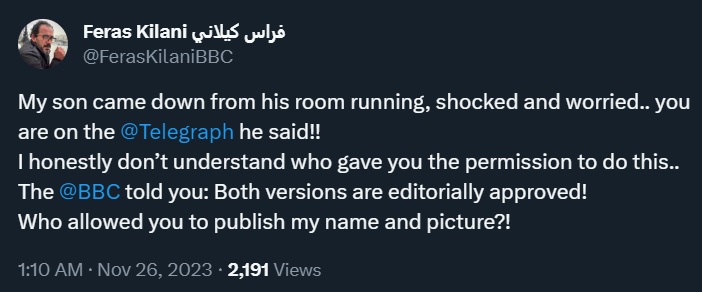
The Telegraph’s report does indeed include a response from the BBC:
“A BBC spokesperson said: “The BBC operates in 43 languages and our reports are not simply translations of each other but will often differ based on contextual factors such as the knowledge base of each audience, and the other stories or interviews we have published on the subject.
“The articles you highlight, published three weeks ago, have both been through our robust editorial processes.””
In other words, the BBC is apparently now telling its funding public that it tailors its journalism according to the intended audience.
Some of course might say that informing audiences in the Arabic speaking world of the “the wealth of evidence of Hamas men shooting unarmed adults and children” and countering the terrorist organisation’s baseless denials of targeting civilians is precisely the type of “knowledge base” contributing content that should be a priority for the UK national broadcaster that is obliged to provide “high-quality news coverage to international audiences, firmly based on British values of accuracy, impartiality, and fairness.”

